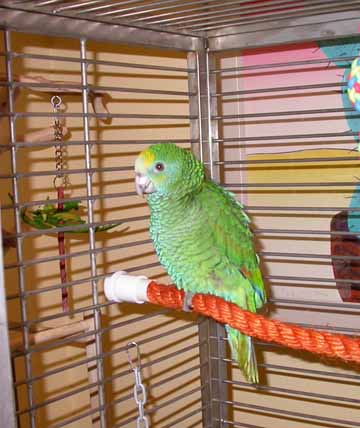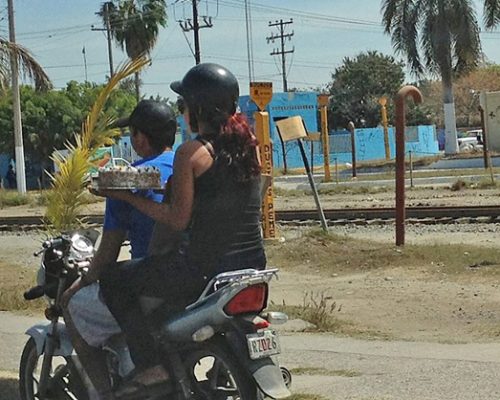…He loved me and I left him and now he don’t love me no more…
When I was in San Francisco last month I stayed with my best friend Jeannie. When we were planning our move to Mexico we asked her if she’d mind taking care of our yellow shouldered Amazon, Tiko, for a couple of weeks until we got settled in our new house. I planned to fly up and bring him down on the plane with me.
FAIL!
I went to the Department of Agriculture here, and talked to the airlines, and did my best to research how to bring him into Mexico with me. My friend Jeannie works for a veterinarian and she talked to people she knew in US Customs. It seems bird flu, the poultry business, the H1N1 virus, and the CITES (the Convention on International Trade in Endangered Species of Wild Fauna and Flora) Agreement have conspired to keep our pet outside of Mexico.
Tiko is a US born bird, bred in captivity. He has his papers and is healthy. We have now given up hope that he’ll join us in Mexico. I know Jonna and Mimi in Merida recently made the hard decision to permanently place their birds, as they had been hoping like we had that they’d be able to bring them to their new home. Acquaintances here in Mazatlán remodeled their house to create a fantastic aviary for their two birds in Canada – and they are similarly frustrated.
So one of the things I was looking forward to when I made my recent trip was getting to visit with Tiko again after almost three years. I didn’t know if he’d remember me, or what to expect. When I walked into the room it was late afternoon and all the birds in Jeannie’s bird room were pretty excited. They were all displaying their tail feathers and climbing all over their cages. Tiko recognized me, but he was just very interested in me – nothing more.
I spoke to him and he watched me and responded a little, but it was obvious to me he had bonded with Jeannie’s other birds and Jeannie. This didn’t make me sad as I thought it might since it is obvious that he can’t come with me and should be bonded with Jeannie as his new owner.
Jeannie has other birds – in the video below you will see and hear Sally (an Amazon), Peaches (a Cockatoo), Oscar (a 40 year old Double Yellowhead Amazon), and Tiko. Not shown in the video are Arnie (a 40 year old Mexican Red Headed Amazon) and two cockatiels. Tiko is about 7 years old, and has now spent almost three years with Jeannie. At the beginning of the video the birds are all getting a squirt bottle bath.
I am sad that Tiko and I didn’t have a bit of a cuddle like we used to, but I am happy that he loves Jeannie and has settled into his new home.





jennifer
May 2, 2010I am so sorry, Nancy, that Tiko will never make his home with again. But it’s good that you got to see him again and know that he is well loved and happy in his new home.
Steve Cotton
May 2, 2010It is moments like this for which the word bittersweet was created. I have been thinking of Jiggs the last two weeks now that I am back in the house where he was raised. It reminds me just how much the animals in our lives mean to us.
Zoe
May 2, 2010Those are amazingly lovely birds. I have never had the draw to own a bird but can certainly appreciate them. Tiko probably remembered you but was just acting coy. “I’ll show HER”.
Nancy
May 2, 2010Jennifer, Thanks, I thought I would be in a lot more pain about this than I am. He is fine and happy, and Jeannie loves him.
Steve, Bittersweet is right. But mostly bitter, really. I mean why the hell should my little parrot, bought legally in the US be such a hazard to transport. Huge trucks full of poultry, maybe. Or trucks full of illegally acquired birds, but not a captive bred bird from a fancy bird pet store. Don’t get me started!
Zoe, Birds can live up to 80 years so the commitment you make when you get one is serious. They are beautiful, though, and Tiko’s face is just so happy!
Jonna
May 2, 2010yeah, bittersweet. He looks very happy and it looks like such a wonderful place for him. I too could go off on a rant about misguided regulations that only hurt those who obey the law or how I think the poultry industry has done so much to threaten pet birds. But, ni modo eh?
I’m glad Tiko is happy and in such a wonderful home. We do the best we can but it still hurts.
Mexican Trailrunner
May 3, 2010Aw, that was fun! The birds are so healthy looking and happy too. It’s sad that you can’t bring him back with you, but how lucky you (and he) are to have found such a good home for him. Painful to visit tho. . .
Chrissy
May 3, 2010I am so glad you got to visit him and he is doing well. Over the last week, we have had a house guest that bonded with Tango our 4 year old Sun Conure. Celeste cried when I asked her if she wanted Tango when we move to Mexico. I am very happy that he will be living with a person that he already knows and who loves him. He gave her kisses and purred to her just as he does with me. It will break my heart to leave him behind.
John Calypso
May 3, 2010About five years ago we decided to give up our Blue and Gold Macaw knowing we were moving here to Mexico. Like you we researched and even considered smuggling – but our boy would not have been quiet ;-0
In any case like you we found a good home – but it still grates on me that these people have such control over our lives to force us to give up our pets as if we were ALL bird smugglers or ???
Now I have developed a conscience for caging up and taking birds out of their more natural environment. We see many wild birds being sold in the Mercados as well as people in the country trapping wild birds – this is sad.
Giving up our bird was a very tough thing to do. So we can sympathize with your situation. ;-(
Nancy
May 3, 2010I guess we are quite a club… Jonna and John have both given up birds and Crissy will have to before her move. It really is a mess, but it does help to know that others understand. So thank you all!
Alan in Merida
May 6, 2010I am so sorry to learn of your separation. Tiko is fortunate in having found a good replacement home. Was Tiko a CITES category I macaw? Sad to is Jonna separation from her two birds. I know my wife would be devastated if that were to happen to us.
With more than one prayer, I believe we are within a month of importing Randy, our blue and gold macaw (CITES II category) directly into Merida, Yucatan via Continental, BWI-IAH-MID. We, and particularly I, have been working on this since September 2009. We have found the relevant SEMANART (environmental ministry) and SAGARPA (agricultural) officials here to be friendly, informed, intelligent, and cooperative. Just about the other end of the pole from the bureaucrats in USDA/APHIS/VS/VS_ER, who have been giving us crap, and also have been making life difficult for their field office veterinarian in Annapolis, who has been trying to be helpful. As late as yesterday, VS_ER sent me a non-responsive e-mail directing me to an APHIS website that posts a link to an obsolete year 2007 form of theirs, rather than to the significantly different July 2009 health certificate form.
And, yes, Grupo Aduanero Peninsular staff, our customs broker, seem to be very much on the ball. GAP in January handled clearance with the Aduana of our household container shipment.
Can you believe that an adult mascot bird has to have a completed poultry hatchling form (VS 17-6) completed, but that for weeks the APHIS/Veterinary Services bureaucrats were refusing to explain how that inapplicable form (which I have never seen so far) applies to our macaw!! They are saying it is a Mexican requirement, but some idiot in the USG put it in or accepted that as a clause in the Protocol of requirements. This is all in trying to obtain a USDA health certificate. We already have U.S. CITES approval from the Dept. of the Interior/USF&WS, Mexican CITES approval from SEMANART, an Form approved by SAGARPA on what the health certificate requirements are (no mention of a VS 17-6).
Finding a USDA approved lab that would perform the needed tests, including against velogenic Newcastle’s (!), was not exactly fun either, but relatively easy. Thought we’d have to send samples to Texas A&M in College Sta., Texas, but they perform the Newcastle’s as a serum test, we wanted the more swab test. The Md. Dept. of Agriculture Animal Health Hospital in Salisbury, Md. has said they can run all the tests Randy needs. We just hope Randy was never vaccinated against Newcastles, as a vaccination, though done 20 years ago, could or would produce a false positive, positive nonetheless. (We adopted Randy from a D.C. area animal shelter that no longer accepts birds.)
If Crissy is reading this, please contact me. If it is not a CITES I issue, or an issue of trying to import a bird considered native to Mexico, perhaps my combat experience can be of assistance.
Nancy
May 6, 2010Alan, I am so excited for you! That is wonderful news. Our parrot, Tiko, is a yellow-shouldered amazon. When you have Randy back with you, I would sure love it if you would write a “guest blog” about the process, I think a lot of people would be interested.
Chrissy, I hope you and Alan are able to connect and make progress towards getting Tango into Mexico.
Zoe, Yes, it was a wild time taking care of 50 little ones, if you had been in Maz then I’m sure you would have pitched in, too.